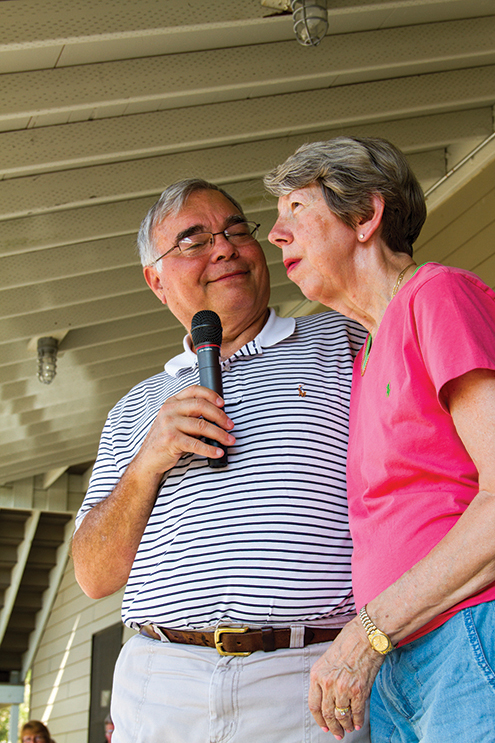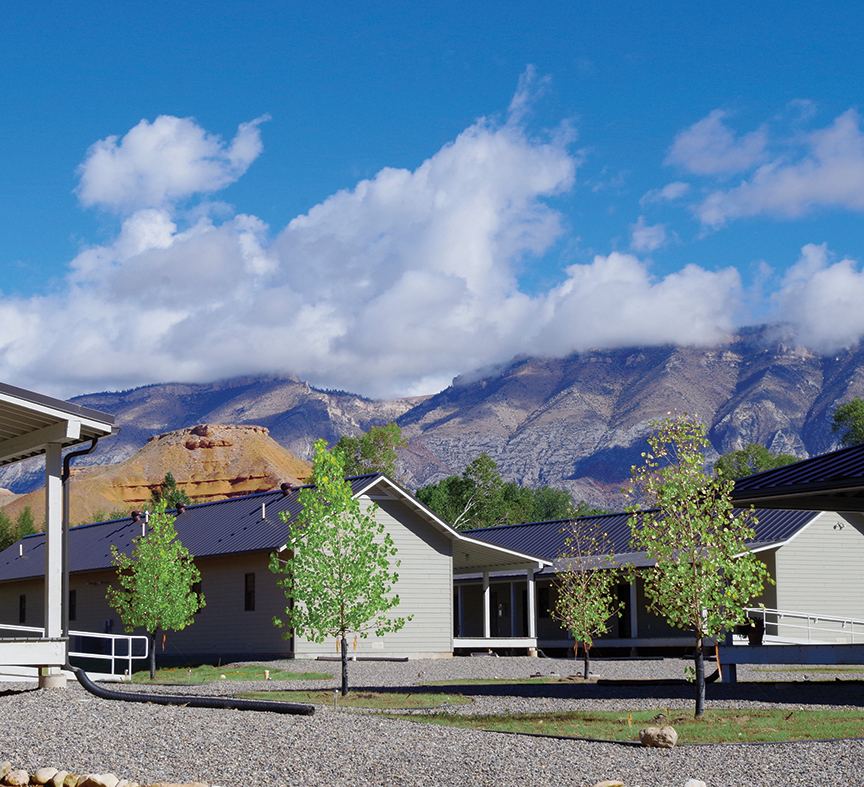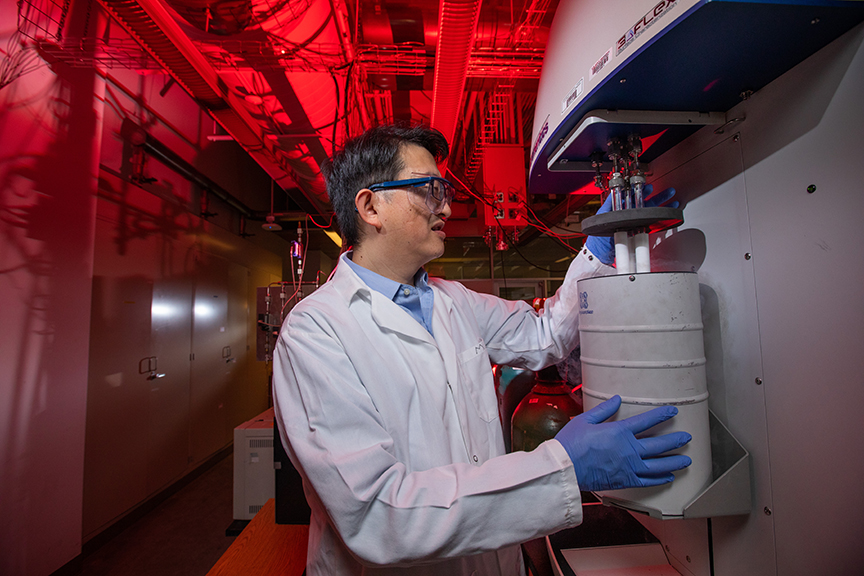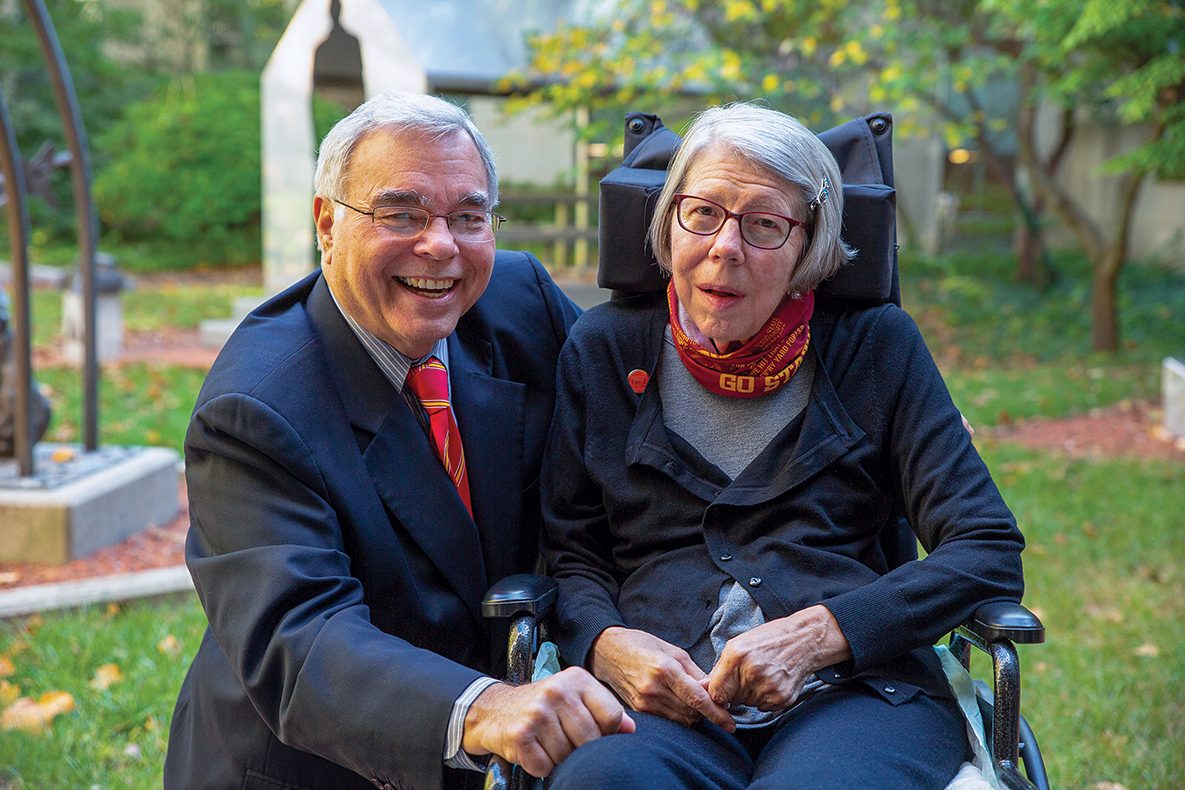Tom Smith likens his business philosophy to planting acorns.
In 1984, Tom (’68 geology, MS ’71) and his wife Evonne (’68 textiles and clothing) launched Seismic Micro-Technology, an enterprising company that created the first Windows-based software used to pinpoint sources of gas and oil in the Earth’s subsurface. In the early days, Tom and Evonne were the only employees of the Texas-based company; Tom developed the geophysics software and Evonne tackled the financials.
With a business plan that included conservative spending (the Smiths never borrowed a penny to establish or sustain their business) and putting their customers’ needs first, the couple grew the company to 150 employees worldwide with branch offices in Western Europe and Asia.
In 2007, the Smiths sold Seismic Micro-Technology to venture capitalists who held the company for four years before selling it to the IHS Markit data analysis company. Today, 2,700 companies in more than 95 countries use Tom and Evonne’s software for petroleum exploration.
Love blooms at Iowa State

The Smiths, who reside in Austin, Texas, have never abandoned their Iowa roots. Tom grew up in Okoboji, where his family owned and operated a resort, a trailer park and a hotel. His summers were spent cleaning cottages and attending to the needs of vacationing guests. Evonne, a rural girl from northwest Iowa, spent her summers outdoors on her family’s farm. For both of them, there was no question where they would attend college. It would be Iowa State University.
“I know that for Evonne there was never any discussion around her kitchen table about a choice of college, and there wasn’t any discussion around my kitchen table, either,” Tom said.
During their undergraduate years, the two crossed paths at the Safari Lounge in downtown Ames. Tom was immediately smitten with Evonne and sought out her phone number from a sorority sister. Their relationship took root and flourished.
Following graduation in 1968, Tom began work on a master’s degree in geology at Iowa State while Evonne became a clothing designer in Denver. Long-distance dating was difficult for the pair. One day while driving Evonne to the airport for a flight back to Denver, Tom decided they had been apart long enough. He asked Evonne to marry him outside the airport terminal. She said yes, and their lifelong journey of learning, laughing and working side by side began in an airport parking lot.
Tom credits Evonne for much of the success they shared at Seismic Micro-Technology, and most everything else in their marriage.
“Evonne is a trooper. She’ll do whatever it takes to make ‘it’ a success, whatever ‘it’ is,” Tom said.
Especially now, as Evonne battles Parkinson’s disease, Tom still beams when he talks about her resilience and fortitude as well as their commitment to each other.
“We decided early in our marriage that we were going to do things together. Every family works on different dynamics,” Tom said. “For our case, whatever it was, we were going to do it together.”
Seeds of success
Now, back to those acorns. When Tom was CEO of Seismic Micro-Technology, he regularly attended gas and oil conventions. He’d set up a booth, hand out literature and chat with people about how his software company could enhance their petroleum businesses.
Tom was planting acorns.
“Somebody might immediately be ready to test our software and decide whether they’re going to buy it or not. Or maybe they’ll call in six months, or maybe they’ll call you after six years or so. You never know. All you’re doing is marketing, not sales. The marketing part is planting acorns,” Tom said.
Tom understands that growing an acorn into a majestic oak tree is not a speedy process. It takes up to 20 years for an oak tree to reach maturity, and some oak varieties won’t produce acorns for 50 years.
Business relationships are like those acorns, according to Tom. They must be nurtured over time.
“We focused completely on taking care of our customers and helping them succeed,” Tom said. “We truly had no expectation about trying to get rich or anything else. We were 100% focused on our customers’ success, not ours.”
Forever true

As their business grew, the Smiths felt compelled to give back to Iowa State University. Their first contribution funded improvements to the Carl F. Vondra Geology Field Station in Wyoming’s Big Horn Mountains, where Tom spent time as a geology student. The outdated facilities consisted of World War II-era buildings, a shower house and an outhouse, affectionally known as the “five-holer.” Thanks to the Smiths’ generosity, visiting students now have access to flushing toilets.
“I challenge anybody to get under that donation level of basic needs to Iowa State. Let’s call it the five-hole challenge,” Tom said, laughing.
The unusual ask for a new sewer system at the field camp did not deter the Smiths’ philanthropic enthusiasm. Since their initial donation, they established the Smith Family Foundation Departmental Chair in Geology and an endowed fund that supports students in Evonne’s home college, the College of Human Sciences.
Tom said their financial support of Iowa State is like eating oatmeal.
“It’s just the right thing to do,” he said.
Funding frontier science
In fall 2021, the Smiths shifted their philanthropic focus to research — specifically projects that may not reap economic or scientific significance for a decade or more. They established the Frontier Science Fund in the College of Liberal Arts and Sciences to support and advance high-quality research projects with fundamental and positive societal consequences.
“We need to promote science to the youth — its wonders, its excitement of discovery and its path toward understanding,” Tom said. “The fund is not only meant to spark the great minds already here at Iowa State, but present the essence of this work to stimulate others, particularly ISU students, faculty and general industry.
“The best researchers are the ones that come up with the best questions. Anybody can work on the answers, but what starts all good investigation is a good question. Good questions lead to discoveries,” he said.
Thanks to the Smiths’ generosity and passion for pushing scientific boundaries, LAS expects to fund at least two research proposals annually, up to $50,000 each. Proposals must be led by an LAS-tenured faculty member in a science department. Priority will be given to proposals with the potential for significant impacts on LAS’ research mission.
“We need to promote science to the youth — its wonders, its excitement of discovery and its path toward understanding. The fund is not only meant to spark the great minds already here at Iowa State, but present the essence of this work to stimulate others."
For Tom, there was never any question about LAS’ role in the frontier science fund.
“This is the short answer,” he said. “Fundamental science lives here.”
What is frontier science, exactly?

Scientific research at Iowa State comes in all shapes and sizes. It addresses many different problems with numerous timelines. Some of this work quickly solves compelling societal problems in a matter of months or a few short years. This typically is called applied science. On the other hand, frontier science sometimes is called basic or fundamental science. It is research driven by human curiosity, not necessarily toward a particular application.
“In a scientifically and technologically advanced society like the United States, research projects with longer time horizons and economic significance that may not be realized for a decade or more are just as important,” said Beate Schmittmann, dean of LAS. “Those are the investments that a country makes in order to stay at the cutting edge of science and to ensure a technologically and economically competitive future, not just next year but in the next decade or maybe even the next century.”
Schmittmann points to the development of semiconductors, which began roughly 75 years ago, as a prime example of frontier science. Semiconductors were new and researchers were only beginning to understand their properties. They never could have guessed, she said, how many electronic devices today would depend on semiconductors.
“In a scientifically and technologically advanced society like the United States, research projects with longer time horizons and economic significance that may not be realized for a decade or more are just as important.”
“Today, we’re having trouble building cars, appliances, cell phones, computers, you name it, because there is a supply chain shortage of semiconductors,” Schmittmann said. “The original researchers could have never predicted those outcomes. But you can see how critically we depend on these materials, their properties and applications today.”
Plant some acorns
The Smiths hope their commitment to the frontier science fund is another acorn in the forest of their lives that will take root and inspire other Iowa State alumni and friends to invest in the limitless possibilities of fundamental research. Schmittmann says LAS is ready to cultivate that growth.
“If our alumni are excited about this opportunity — this kind of work at Iowa State University, the opportunities that it creates for students — then I would love for them to contact us about adding to the fund,” Schmittmann said. “This is a fund we want to grow for the future.”
If you would like to support the frontier science fund, visit
www.isuf.info/frontierscience.
